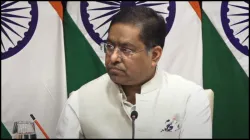'He is entitled to his opinion...': India reacts to US envoy Eric Garcetti's 'no strategic autonomy' remark
The Ministry of External Affairs said India-US relations gave space to "agree to disagree" on certain issues and that India valued its strategic autonomy. Garcetti earlier said "there is no such thing as strategic autonomy" after PM Modi's visit to Russia.

New Delhi: India on Friday reacted to US Ambassador Eric Garcetti's remarks on "strategic autonomy" regarding New Delhi's longstanding ties with Russia, saying he was entitled to his opinion and that India valued its strategic autonomy. This was in response to Garcetti's veiled comment that there was "no such thing as strategic autonomy" in times of conflicts.
"India, like many other countries, values its strategic autonomy. The US Ambassador is entitled to his opinion. We also have our own and different views. Our comprehensive global strategic partnership with the US gives us the space to agree to disagree on certain issues, while respecting each other's viewpoints," said Ministry of External Affairs spokesperson Randhir Jaiswal said in the weekly press briefing on Friday.
During the briefing, Jaiswal also described India's relationship with the United States as a "comprehensive, strategic and global" partnership. "We have a lot of issues to discuss and both sides engage with each other on several aspects of the relationship, and we discuss all issues that are of interest to both parties," he added.
'No such thing as strategic autonomy': Garcetti
The US envoy's veiled remark came in the context of India's growing relationship with Russia after Prime Minister Narendra Modi's visit to Moscow. He said India likes its strategic autonomy, but "there is no such thing as strategic autonomy" in times of conflict. "We will in crisis moments, need to know each other. I don't care what title we put to it, but we will need to know that we are trusted friends, brothers and sisters, and colleagues in times of need," he said.
The renewed Western focus on relations between India and Russia came as PM Modi met Putin in Russia, his first visit there in five years, where participated in the 22nd India-Russia summit. During his visit, he told Russian President Putin that a solution to the Ukraine conflict is not possible on the battlefield, and peace talks do not succeed amidst bombs, guns and bullets. It is important to note that relations between the US and Russia have plunged to their lowest since Moscow's invasion of Ukraine.
US concerns over India-Russia relations
On Monday, the US called on India to use its long-standing relationship with Russia to tell Russian President Vladimir Putin to end his "illegal war" in Ukraine. Several US departments expressed concerns over India-Russia relations in light of Prime Minister Narendra Modi's high-profile visit to Moscow, where he was greeted by Putin as a "dear friend".
"India has a longstanding relationship with Russia. I think that’s well-known. And we have – speaking for the United States – encouraged India to utilise that relationship with Russia, that longstanding relationship and the unique position that they have, to urge President Putin to end his illegal war and to find a just peace, a lasting peace to this conflict; to tell Vladimir Putin to respect the UN Charter, to respect Ukraine’s territorial integrity and sovereignty – sovereignty," said the US State Department spokesperson Matthew Miller in a briefing.
The White House called India a "strategic partner" and said its relationship with Russia can persuade Putin to end the over two-year war in Ukraine. The US Defence Department said it will continue to view India as a strategic partner and have robust dialogue with the country. PM Modi and Putin set a target of increasing bilateral trade to $100 billion by 2030 from about $65 billion at present during the former's visit.
ALSO READ | Will Biden withdraw from US presidential race? 'Under pressure' President to make major announcement